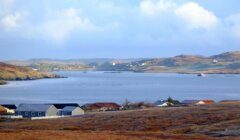Climate / Council to revise carbon plan targets
SHETLAND Islands Council (SIC) is set to revise the targets of its carbon management plan amid growing pressure to declare a climate emergency.
A statement by SIC chief executive Maggie Sandison followed criticism by environmental group Eco Youth Shetland that the council had “kicked the issue into the long grass” by seeking a plan of action before declaring a climate emergency.
By the end of July more than half of UK councils had pledged to cut carbon emissions by declaring a climate emergency – creating one of the fastest growing environmental movements yet.
But Sandison said that such a move was an “empty statement” without first formulating a plan to cut emissions. The executive, she added, would table revised plans before councillors later this autumn.
She said: “The council aims to reduce our carbon footprint over a number of years, through our carbon management plan. With the Scottish Government’s decision to achieve net zero by 2045, we will revise our plans and targets and will present these to councillors in the November committee cycle.
“I am delighted to see the increasing community interest and understanding of climate change and the priority that is being placed on it by Scottish Government in their Programme for Government.
“The council has heard and understood the desire of Eco Youth Shetland for the council to declare a climate emergency. When we met with them at the school strike, we explained that declaring an emergency without any plan to tackle it is really an empty statement.
“Whilst the statement raises awareness it doesn’t make any tangible changes to policy, practice or carbon emissions. Any declaration should come with an action plan with targets so that there is accountability for change.”
Become a member of Shetland News
Sandison said the council had asked young people to work with the local authority and the Shetland Partnership to stage an event to “develop individual, organisational and community response to climate change. The aim of this would be to produce a community action plan with targets, to demonstrate that change is being delivered”.
She added that the council “does not hold all of the levers” to manage Shetland’s carbon footprint.
“There are important choices that each individual and organisation needs to make about what they buy and how they buy goods, reducing waste and recycling more, their use of clean energy and water, switching off appliances, active travel, car ownership and use of public transport,” said Sandison.
Become a member of Shetland News
Shetland News is asking its readers to consider paying for membership to get additional perks:
- Removal of third-party ads;
- Bookmark posts to read later;
- Exclusive curated weekly newsletter;
- Hide membership messages;
- Comments open for discussion.
If you appreciate what we do and feel strongly about impartial local journalism, then please become a member of Shetland News by either making a single payment, or setting up a monthly, quarterly or yearly subscription.
















































































